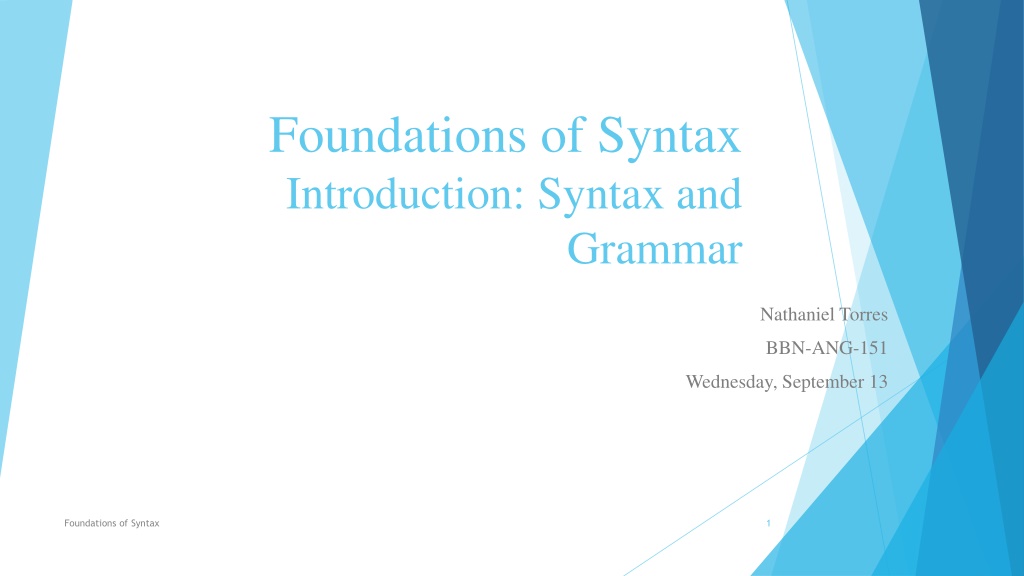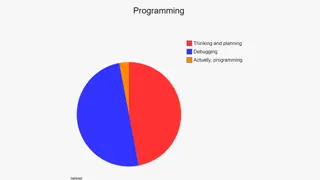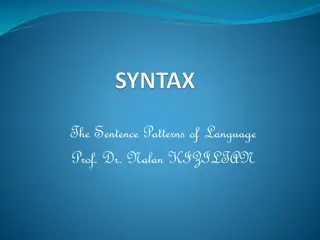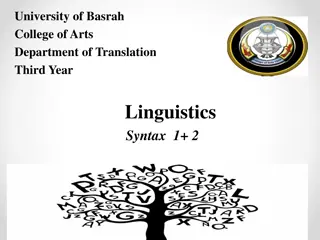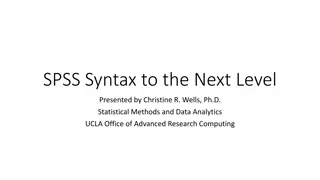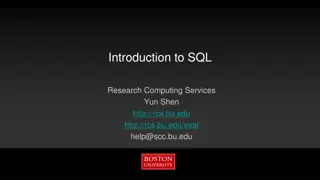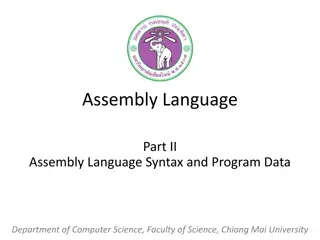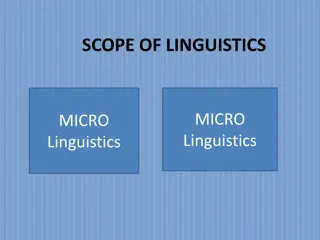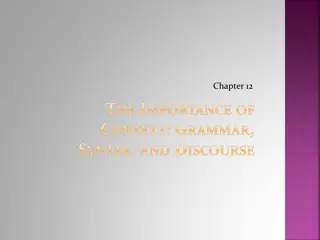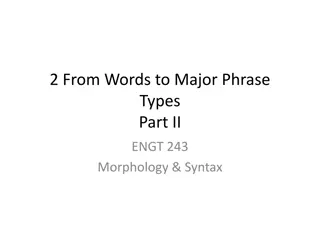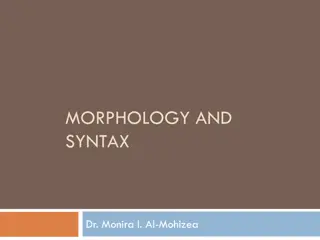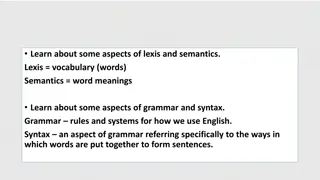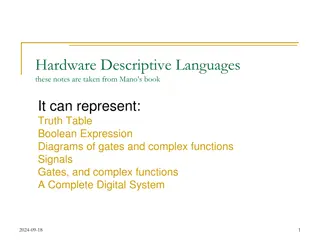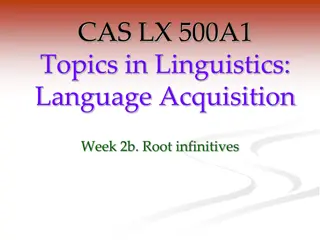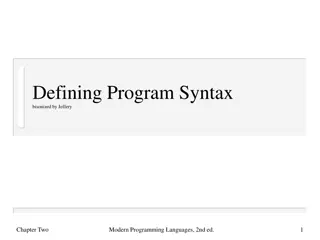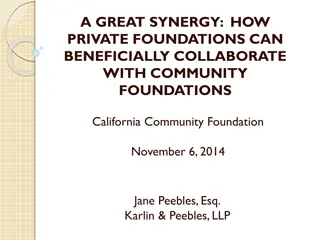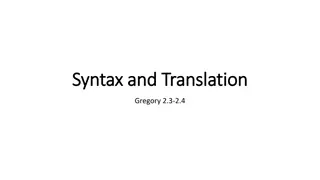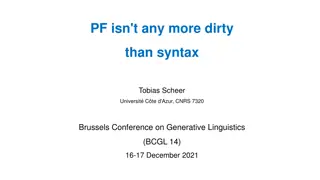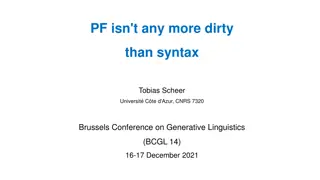Understanding the Foundations of Syntax in Language
Delve into the basics of syntax and grammar, exploring the essence of language, syntax rules, morphemes, and morphemic decomposition. Discover how syntax shapes meaningful communication and learn to identify morphemes in English words.
Download Presentation

Please find below an Image/Link to download the presentation.
The content on the website is provided AS IS for your information and personal use only. It may not be sold, licensed, or shared on other websites without obtaining consent from the author. Download presentation by click this link. If you encounter any issues during the download, it is possible that the publisher has removed the file from their server.
E N D
Presentation Transcript
Foundations of Syntax Introduction: Syntax and Grammar Nathaniel Torres BBN-ANG-151 Wednesday, September 13 Foundations of Syntax 1
Language Syntax is a function of language (either spoken or mechanical). Our first question is: What is a language? Foundations of Syntax 2
Language (cont.) Language is a system of communication, composed of words and signs. The elements that make up a language are subject to rules that condition the way in which they are put together. This is syntax. Foundations of Syntax 3
Syntax Is Key Without syntax, sentences would be garbled collections of nonsense. Consider: Mary green in park is the dog with the. Syntactic rules specific to each person s native language condition the way in which the elements that make up language come together. So, for English, the above nonsense would be realized: Mary is in the green park with the dog. Foundations of Syntax 4
Language Composition Language can be decomposed into a system of signs. Signs=words and morphemes Foundations of Syntax 5
Composition We are all aware of what words are. What are morphemes? Morpheme: A segment that cannot be divided into smaller, meaningful parts. Foundations of Syntax 6
Exercise Can you think of morphemes in English? Can words be morphemes, too? Foundations of Syntax 7
Answers Some morphemes in English include re-, -less, un-, im-, -able,-ness. Can words be morphemes? Yes. Words like school, water, weather, house, etc. are all morphemes. They cannot be broken up into smaller parts. Foundations of Syntax 8
Morphemic Decomposition If we take any sign, and decompose them into their smaller signs, we can see how signs are composed to contribute meaning to the sign. Consider: Irreversible Unsavoriness Let us decompose these signs into their morphemic parts: Ir- (in-) reverse able not-reverse-able to = unable to be reversed Un- savory ness not-savory-state of = the state of not being savory Foundations of Syntax 9
A Little Practice Decompose the following signs into their parts and compose meanings for them. Irreplaceable Anticoagulation Foundations of Syntax 10
Answers Ir-replace-able Not-replace-able to be = not able to be replaced Anti-coagulant-tion Against-coagulant-process of = the process of preventing a coagulant from working Foundations of Syntax 11
Compositionality All of these morphemes, which in turn create signs (via words and morphemes that cannot stand alone) can be used to construct larger ideas. Compositionality refers to the idea that signs can be put together in order to create more complex meanings. For natural (human) languages, this means an infinite number of compositions for an infinite number of plausible meanings. Language is thus the signs that make up the language, and the rules that govern how they are put together. (Recall our example: Mary is in the green park with the dog.) Foundations of Syntax 12
Compositionality (Cont.) Without rules to govern the way in which we construct sentences, any output is possible, and that is of course, not the case if we want to achieve sensical interpretations in our utterances. These rules that govern the signs, or our lexicon, are collectively known as syntax. A language s syntax is idiosyncratic, that is to say, languages do not all have (on the surface) the same syntactic rules. Work towards a Universal Grammar (UG) would, however, argue that all syntax is underlyingly the same cross-linguistically. Controversial, as linguistic diversity would seem to indicate that language differentiation is indicative that a UG would be difficult to prove, if it all possible. Foundations of Syntax 13
Idiosyncrasy Without into getting into the minutiae of UG, we will take a surface level approach and showcase how syntactic rules seemingly differ cross- linguistically on the surface. Consider English versus a language like Korean which differs in the rules governing wh-words (interrogatives). What did John eat at his friend s house? Jon-eun chingu-ui jib-eseo mwo meogeosseoyo? John-TOP friend-GEN house-LOC what eat.PST (Informal Polite) What did John eat at (his) friend s house? Foundations of Syntax 14
Idiosyncrasy (Cont.) As you can see, in Korean, the wh-word does not need to come at the beginning of the sentence as it does in English. If we tried to reproduce the Korean word order in English, then we would get the following: John at his friend s house what ate? As we can see, this is very bad English, but perfectly possible in Korean (in fact, the word order of the wh-word is far more flexible in Korean and can appear in other positions as well in that clause including the start of the sentence like English). English syntax, therefore, requires a rule that obligatorily moves the wh-word to the left periphery of a clause. Languages like Korean (and a number of others, are called wh-in situ languages as a result, since the wh-word does not need to move). Foundations of Syntax 15
Syntax You can think of syntax kind of like the glue that binds together the other aspects of human language. The way in which the different lexical elements come together directly affect their semantic interpretation and even their phonological output. Foundations of Syntax 16
Exercises Break the following down into their morphemic parts and assign the morphemes meanings: Unsurreptitiously Reverberated Overarching Ihatatlans g (Hungarian, undrinkableness ) Krall ks z(Turkish, without a kingdom (adjective)) Evlerdekiler (Turkish, the ones in the houses ) Hint: Kral king ; ev house . Turkish, like Hungarian, is agglutinative, and stacks its morphemes to the right of the root (noun). Foundations of Syntax 17
